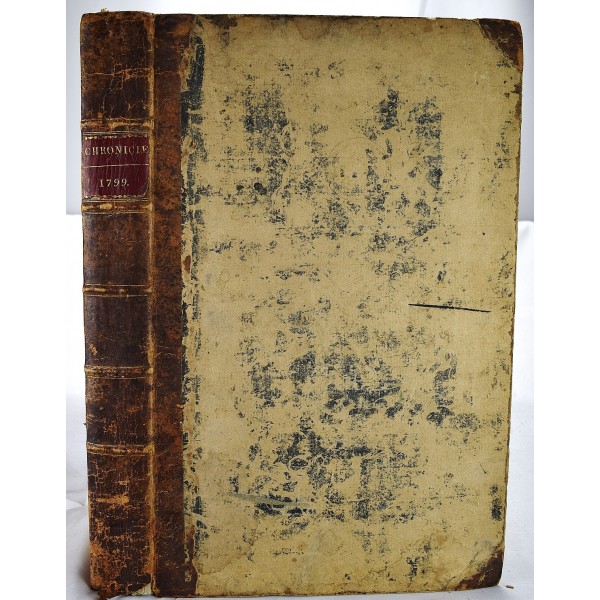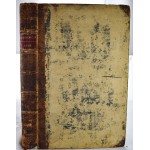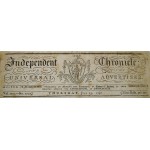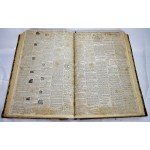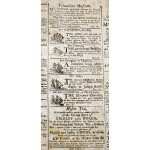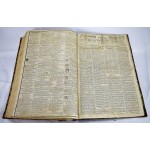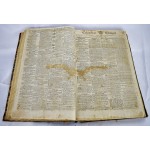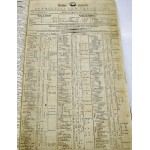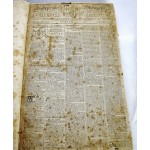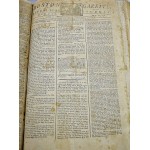The Independent Chronicle & Universal Advertiser (109 issues), J. Russell's Gazette (9 issues) The Boston Gazette (2 issues), Columbian Centinel (20 issues), Boston Gazette and Republican Journal (12 issues) (152 issues total)
The Independent Chronicle & Universal Advertiser (109 issues), J. Russell's Gazette (9 issues) The Boston Gazette (2 issues), Columbian Centinel (20 issues), Boston Gazette and Republican Journal (12 issues) [18th - 19th century Federalist Newspapers, Boston, Mass.] 1796 - 1801. (152 issues total)
Benjamin Russell; Thomas Adams; John Russell; Benjamin Edes; I. Larkin
Boston: The Independent Chronicle & Universal Advertiser, J. Russell's Gazette, The Boston Gazette, Columbian Centinel, Boston Gazette and Republican Journal; Powars & Willis; I. Larkin,1796
152 issues bound as one. Folio, 48 x 30 cm. Printed 1796 - 1801. Bound in early calf backed boards. Boards are worn, but the binding is solid. Internally a few tears, scattered foxing. 608 p. Contents: Independent Chronicle & Universal Advertiser. Vol. XXIX, no. 1701-02, 1704, 1706, 1710, 1713, 1716-17, 1735, 1737; Vol. XXX, no. 1758-59, 1853, 1855; Vol. XXXI, no. 1856-59, 1861-92, 1894-97, 1899-1920, 1923-60 (109 issues); J. Russell's Gazette. Vol. IX, no. 2, 9, 12-14, 20, 35, 39, 43, 44 (9 issues); Boston Gazette. Vol. X, no. 1 & 10 (2 issues); Columbian Centinel. Vol. XXIV, no. 2034, 2036-37, 2039, 2042, 2045-46 (20 issues); Vol. XXV, no. 2051-52, 2055, 2059, 2071-72, 2075, 2078-81, 2089, 2100; Vol. XXVI, no. 2101-03, 2107-11, 2113-16, 2118-19; XXXIV, no. 14, 36 (20 issues); Boston Gazette and Republican Journal. No. 2269-74, 2276, 2278-79, 2281, 2285, 2287, 2289 (12 issues). Semi-weekly, 4-page Boston newspapers.
The Constitutional Telegraphe (1799-1802, Motto: Advocate of the Rights of Man) and its successor, the Republican Gazetteer (1802-1803) were Jeffersonian Republican papers printed in Boston, Mass . The papers covered the important news of the day: "One cent reward! For a runaway, an indentured servant named Richard Tuttle"; Yellow Fever in Philadelphia, Aug. 30, 1797; the arrival of British privateer ship "The Scourge of Regicides" in New York Harbor; cowpox inoculations; reports from Thomas Pinckney, Secretary of State on the Treaty of Amnity with Great Britain; The Text of the Treaty of Amnity with Great Britain, withdrawal of British troops from American territory, 1796; pro-French propaganda from Lucien Bonaparte and Joseph Fachet; notes from the Massachusetts Society of Cincinnati; Factionalism between Federalists and Anti-Federalists; Electioneering and the battle for the presidency between Adams and Jefferson; The records of the trial of Gabriel Prosser, who was charged with inciting an insurrection by the Negroes, and who was put to death, on Oct. 7, 1800; Boston Gazette, Oct 13, 1800 - a strong statement in favor of "a system of naval defense" "the wooden walls of America" in response to tensions with Europe; debate on the Sedition AC in Congress, Jan. 21, 1801; In an article called, The Natural Cause of the Insurrection of the Negroes, discussion of the rights of man by Thomas Jefferson; An article by Johnathon Brothers of South Carolina arguing for paper money and war with England for seizing US sailors and cursing John Jay; 1796 Treaty of Greenville, between the US and Indians of the Northwest Territory (including Wyandot, Delaware, Ottawa and Chippewa nations), negotiated by Gen. Anthony Wayne; Bonaparte's brilliant campaigns defending revolutionary France; the French conquest of Rome; May 5, 1796, the authorization of money to build the national capitol in Washington DC; attacks on President John Adams; local politics from Gov. Caleb Strong.
Various advertisements including for naval passage, shipment of freight, gunpowder, Franklin and Rittenhouse stoves, rice, tobacco, smoked ham, cinnamon, Havana molasses, cotton from India, shipments from China, Boston beer, Madeira sherry and port wine. Also includes ads from John Hancock about his merchandise. The advertisements paint a picture of Boston as an important early trading port, connected through naval commerce with the larger world. Most of the articles are political. One interesting quote illustrating the development of American identity in the young nation: "Let us not be Englishmen or Frenchmen. But American." - Thomas Adams.
